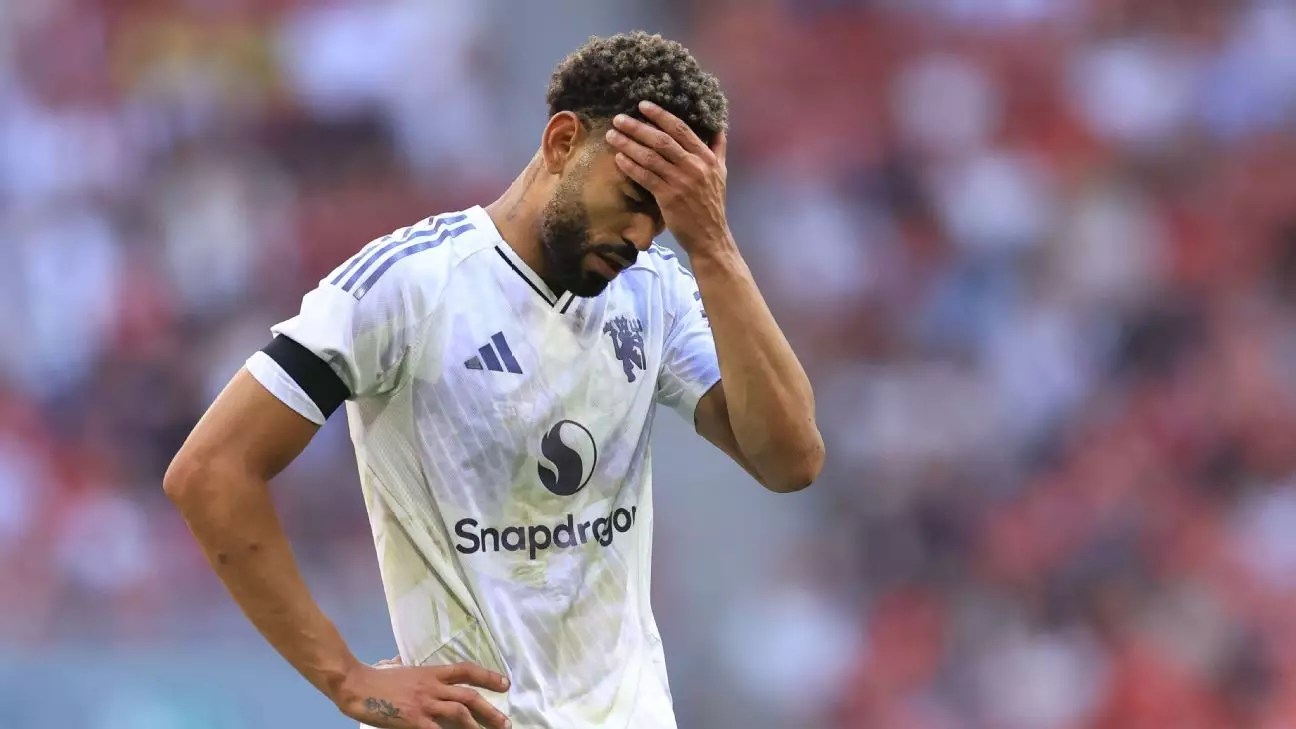Manchester United’s recent preseason draw against Leeds United has cast a spotlight on persistent issues that threaten to undermine the team’s ambitions for the new season. Under Ruben Amorim’s leadership, the club exposed critical deficiencies—most notably, a conspicuous lack of pace and creativity in attack. Despite new signings like Matheus Cunha, the forward line remains unconvincing, raising questions about the club’s tactical evolution and readiness to compete at the highest levels consistently. This isn’t merely about individual performances; it’s about the systemic gaps that prevent United from translating opportunities into goals and momentum.
The absence of frontline firepower was evident. United managed just 44 league goals last season—a painfully low tally for a club of their stature. The preseason outing underscored this issue, with Cunha’s debut showing promise but failing to change the overall lack of offensive spark. The arrangement of Cunha on the left attacking midfield, with Bruno Fernandes dropping deeper, was a tactical experiment that didn’t yet deliver the synergy needed. Such experimentation reveals a broader problem: the team’s attacking identity still feels disjointed, and the front line lacks the dynamism to consistently threaten opponents.
Furthermore, Amorim’s candid acknowledgment of United’s pace deficit is revealing. His point that the midfield is sluggish and unable to effectively initiate attacks underscores a troubling pattern: the team’s transition from defense to attack is too slow, leaving it vulnerable to counterattacks and unable to sustain pressure. Such issues are not quickly remedied—they demand an overhaul of physical conditioning, tactical approach, and perhaps, the reinforcement of player personnel.
Pace and Creativity: The Missing Ingredients for Success
The impending arrival of Bryan Mbeumo might offer a solution to these pressing concerns, bringing the speed and directness that the current squad desperately lacks. Mbeumo’s ability to accelerate play and break defensive lines could inject the required urgency, transforming United’s attack into a more consistent threat. Amorim’s recognition of this necessity illustrates a strategic focus—one centered around adding agility and raw tempo to a team that often looks ponderous.
However, it’s not only about signing a quick player; it’s about cultivating a cohesive attacking rhythm. The chemistry between Cunha and Fernandes is still developing, highlighting a common challenge many teams face after integrating new players. For United to truly unlock their potential, their creative forces need more time and training to synchronize. The coaching staff must emphasize building these connections swiftly, especially leading into season fixtures.
Moreover, United’s problem isn’t solely about personnel but also about tactical mindset. Amorim’s comments suggest a recognition that United must cultivate a style of play that emphasizes quick ball movement and incisive attacking runs. Without it, they risk being predictable and stagnant—an issue that could cost them crucial points in competitive fixtures. The club’s efforts must therefore focus on improving tempo and coordination, both in training and on matchday.
Morale, Transfers, and the Road Ahead
Despite persistent rumors linking Marcus Rashford and others to potential exits, Amorim remains optimistic about the squad’s mentality. His assertion that the team environment is “really good” underscores a belief that internal cohesion can serve as a foundation for improvement. Yet, the dynamic nature of top-tier football demands more than positive moods; it requires tangible progress, relentless work ethic, and strategic reinforcement.
The upcoming U.S. tour presents a pivotal opportunity for United to address these concerns. Matches against West Ham, Bournemouth, and Everton will serve as testing grounds to refine attacking patterns and build essential chemistry. Amorim emphasizes that bonding off the pitch and on the training ground is critical—only through collective effort and shared purpose can they close the gap with top-strong contenders.
Furthermore, the club’s transfer strategy will be closely watched. The potential addition of players like Mbeumo hints at a desire to refresh the squad, but it’s clear that United needs more than just signing talent—they need to reconstruct their attacking identity from the ground up. As the new season approaches, the pressure will mount to turn preseason glimpses of promise into consistent, impactful performances.
Ultimately, Manchester United’s journey this summer hinges on their ability to recognize and rectify these fundamental flaws. Improving pace, fostering chemistry, and sharpening attacking intent aren’t optional—they are prerequisites if United hope to reclaim their rightful place among football’s elite. The preseason may still be in its early stages, but it has already revealed that significant work lies ahead—work that, if tackled decisively, could reignite the club’s prospects and renew hope among fans craving a return to glory.


Leave a Reply